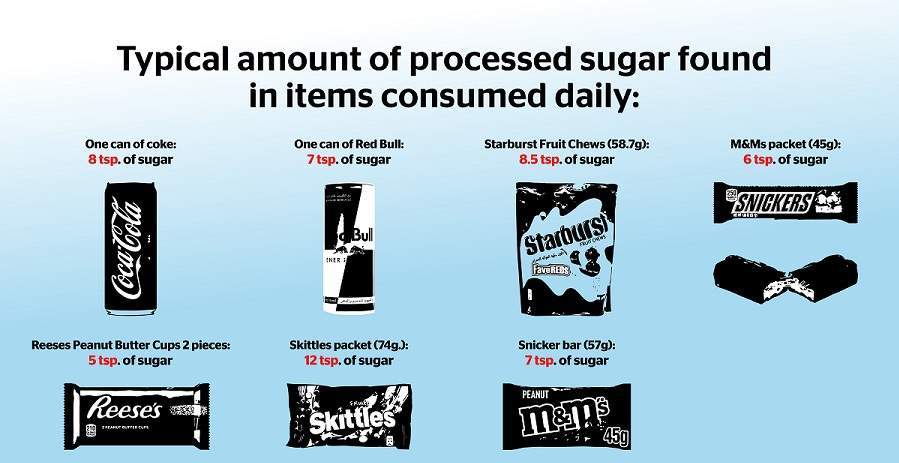Ever wondered how your sweet tooth has evolved? Why you feel the need to consume something
sugary every day?
اضافة اعلان
Recent studies have shown that sugar is as addictive as cocaine, alcohol and tobacco, and should be dealt with as such. The main concern should not be the natural sugars found in fruits, rather the processed sugars that are excessively added in our daily meals.
Sugar is made up of half glucose and half fructose. Glucose is a type of sugar that is essential to the body and is used as an energy source. Fructose, on the other hand, is not essential and is considered empty calories, as there are no biochemical reactions in the body that require fructose to function. Fructose is the only food molecule that is not recognized by the body and can only be metabolized by the liver.
Why is sugar, in specific fructose, considered addictive?
Consuming sugar releases the hormone dopamine, portrayed as the main chemical of pleasure, in the brain. This hormone is also released when ingesting certain nerve-affecting drugs. The
human body tends to desire activities that release enormous amounts of dopamine, developing a reward-seeking behavioral type of addiction. This, in turn, develops some sort of dependency on the consumption of sugar.
Sugar addiction would not be so bad if it were not negatively affecting our body. Following are four ways sugar affects health negatively:
Sugar develops a non-alcoholic fatty liver
Excessive sugar consumption may result in non-alcoholic fatty liver because the liver is the only organ that can metabolize fructose. When liver glycogen levels are high, fructose is immediately turned into and stored as fat. The more fructose consumed the more liver fat builds up, potentially leading to non-alcoholic fatty liver, and this increases the risk of developing diabetes and cardiovascular diseases.
Sugar alters one’s cholesterol and triglycerides profile
Liver usually ships out metabolized fat as very low density lipoprotein (VLDL) particles that are rich in cholesterol and triglycerides. Studies have shown that higher consumption of fructose leads to increased blood triglycerides and increased levels of small, dense
LDL and oxidized LDL, which are harmful to the body. All the above are characteristics of the metabolic syndrome, which increase the risk of developing heart and cardiovascular diseases.
 Sugar is made up of half glucose and half fructose. Glucose is a type of sugar that is essential to the body and is used as an energy source, Fructose, is not essential and is considered empty calories, as there are no biochemical reactions in the body that require fructose to function. (Photo: Envato Elements)
Sugar is made up of half glucose and half fructose. Glucose is a type of sugar that is essential to the body and is used as an energy source, Fructose, is not essential and is considered empty calories, as there are no biochemical reactions in the body that require fructose to function. (Photo: Envato Elements)
Sugar develops insulin resistance and Type II diabetes
The main function of insulin is to remove excess glucose from the blood stream and store it in cells. When you develop insulin sensitivity, your body does not respond to insulin and glucose remains in the blood stream. When this happens, more insulin is secreted; thus, elevated levels of insulin will be found in the blood. Insulin also sends out signals to the fat cells to pick up fat and store them in the body. Therefore, higher levels of insulin in the bloodstream increase fat storage in the body.
Sugar affects satiety signals in the body
There is a reason why we feel hungry when we do and full when we do, as the body releases hormones to regulate our daily food intake.
Ghrelin is a hormone released by the brain that is responsible for hunger; leptin is a hormone released by the fat cells which signals satiety and fullness.
Individuals who consume large amounts of sugar have altered levels of ghrelin and leptin. Studies have shown that high fructose levels do not decrease levels of ghrelin, so the body continues to send hunger signals. High fructose also develops leptin resistance, so the body no longer responds to leptin; this tricks the body to believe fat cells are empty and thus the need to continue eating.
Excessive consumption of sugar is obviously detrimental to health. Cut down on sugar and protect your health. Substitute white processed sugar with natural sweeteners such as stevia, coconut palm sugar, lucuma, yacon, monk fruit or barley fruit. All these natural sweeteners are not only suitable for diabetics, they also provide additional health benefits. Remember: 4 grams of sugar = 1 tsp, so always check your labels.
 Read more Health
Read more Health



